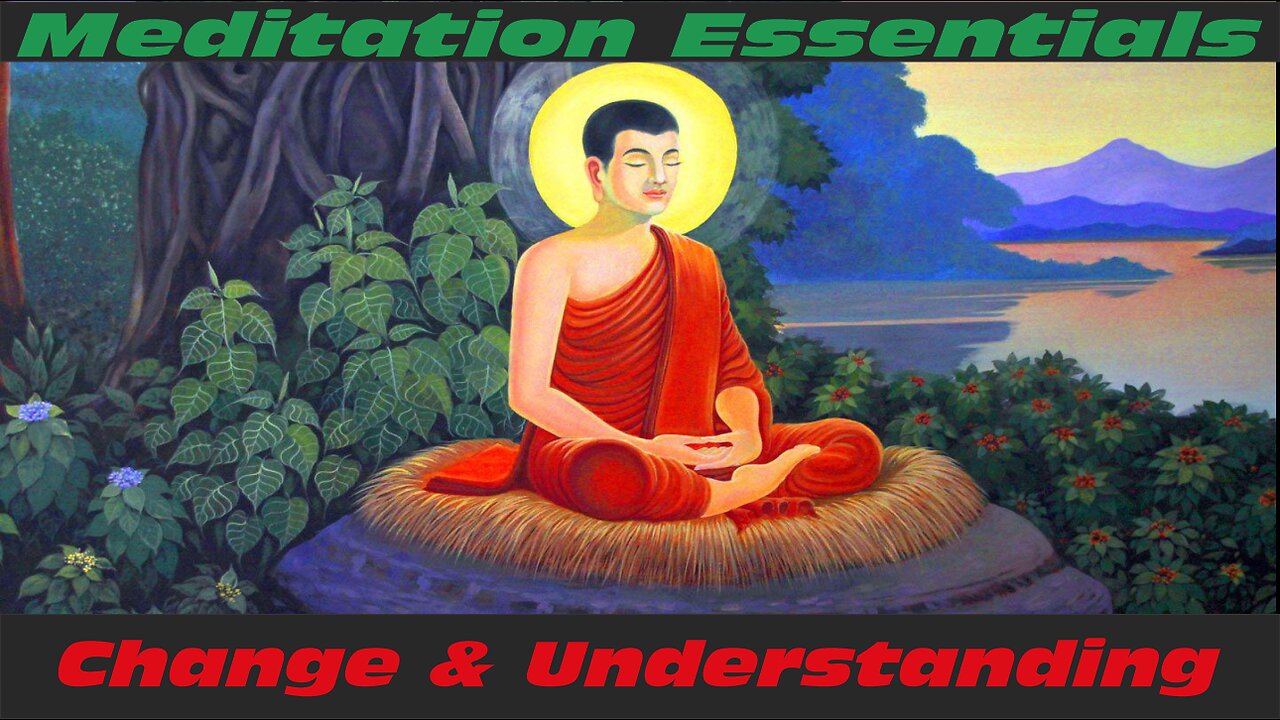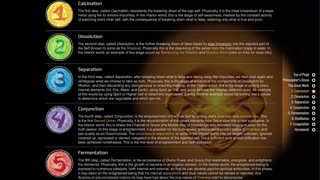Premium Only Content

Meditation Essentials: Change and Understanding
In this tradition we study the scriptures of the great religions, we study all of the sciences, the arts, and the philosophies. In synthesis we study the whole breadth of knowledge that humanity has developed over the course of the centuries. But all of that study, knowledge, and information is useless if we are not able to apply it practically and produce deep changes in our personal lives, now. There is no value of getting an education if you remain the same. Knowledge must be capable of producing change, otherwise it is a complete waste of time.
In our approach to meditation this is especially significant because the teachings of meditation are very subtle, and very difficult to understand with the intellect. That is why it is so easy to become confused by the philosophies and theories of meditation. It is easy to get tangled in the debates between schools and groups, to become attached to one group or tradition over another, to get lost in a labyrinth of competing ideas about meditation.
For the student who is serious about making serious changes in their life, it is necessary to cut through the tangled mess of theories, philosophies, traditions, and ideas, in order to find that which actually results in change. The purpose of studying meditation is to change, so we must measure our study and our practice on that basis and that basis alone. Are we changing? That question cannot remain theoretical or philosophical. It must be answered in facts: observable, provable facts.
Change
Changing theories or beliefs is not real change. Changing our religion or our clothes, changing our hair cut or our diet… these are not real changes. They are superficial. We need real change, fundamental change: deep, profound, permanent change within. We need our mind to change permanently, for the better.
To measure and confirm genuine, lasting change, our attention must be focused on facts of what is observable in our mind, heart, body, and behavior. Real change is measured by who we are inside.
Our modern culture insists that material wealth brings happiness, yet the wealthy are as miserable as the poor. They simply have more money to spend on plastic surgeries, vanity, selfishness, etc. Yet, fundamentally, their external circumstances do nothing to change their fundamental suffering. They still die alone. They still get sick and suffer old age. They still suffer the loss of their loved ones and the loss of their wealth.
We tend to measure our life by our external circumstances: our appearance, our age, our material possessions, our home, our family, friends. Yet, none of these things are reliable indicators of anything at all.
We do not realize that the circumstances of life constantly change and are subject to forces that are beyond our control. Changes in our external circumstances are not a reliable measure of our spiritual status.
The measure of our success in spirituality is the quality of our mind, the quality of our heart and how we respond to the circumstances of life.
We all admire the poor man who in spite of his poverty is happy, content, friendly, patient. His attitude, the quality of his mind, is a choice he makes, and it gives him strength no matter his external circumstances. So, rather than just admiring this attitude, why not adopt it and make it a part of ourselves?
It is possible to have happiness, peace, and contentment. The great masters have shown us it is possible. Isn't that the change we want? That kind of change comes from changing inside, not outside.
Everything in existence is the way it is because of laws. If we want real change, we have to learn about those laws and work with them. This is why we are studying the facts of our lives: to see how those laws are in motion in our lives. The chief among those laws is the law of cause and effect. Today we are going to study how cause and effect are put into motion, and how additional laws direct the causes into effects. In this way, we learn how to produce causes and guide them to the effects that we want.
To do this successfully, we first have to understand that we do not see reality, as discussed in the previous lecture. When we begin to look past appearances to see the forces that are actually at work, we come to understand that this modification to our internal behavior changes our external circumstances. Yes: we have always had it backwards.
We mistakenly think that if we change our external circumstances we will then be happy and content. That idea is mistaken. Internal happiness does not come from external circumstances. Those who seek contentment and happiness in external things — people, places, possessions, status — are always and inevitably disappointed.
The truth is that if we change internally first, then not only to we find a real and lasting happiness that does not depend on impermanent and unreliable external circumstances, but then our external circumstances also change.
Everything that is happening in our lives is simply a reflection of our quality of mind, our level of being.
People spend their lifetime trying to change their external circumstances, and they all die having failed. No matter what one acquires or how great ones external circumstances, all of that is lost at death: but you take with you your quality of being. If you live life attached to possessions and people, you will continue to be that way after death, thus you will never find contentment, happiness.
When you study the great spiritual achievers, they did not focus on changing their external circumstances, but changing their internal circumstances. By changing their mind, changing their psyche, then their external circumstances changed as an outcome of that internal change.
Then we must ask ourselves, and know how to answer: what is change?
Genuine, deep, lasting change has three characteristics or three aspects: something dies, something is born, and something is sacrificed. When a change is profound, not only do we see these three aspects, but the consequences of the change fundamentally change everything around, as well.
To understand change, we need to understand these factors and the environment they occur within.
Change in levels
We study the tree of life because it helps us to understand the laws of nature.
One significant fact that the tree represents is that change flows from the subtle to the gross. To create something, first you have the inspiration, the idea, then the plan, then the process of figuring it out, then the building of it, until finally it becomes a reality in the world. Nature exists in a similar way: before anything happens in the physical world, it happens in the subtle, internal worlds. This is why our dreams can show us what will happen in the future. In dreams, we can see what is in formation and may eventually appear physically.
We can use this knowledge to help us change. If we want our physical life to change, then we must change internally.
It follows then that if our knowledge and understanding is deeper, more internal, then the change we can expect will be greater. That is, understanding something in the physical world is not difficult since it only requires observation by the physical senses. Yet, that level of knowledge can only lead to fairly superficial change. Compare that with knowledge of energy, or emotion, or the mind, or will… the deeper your insight, the more powerful it is, and the more it can change on the levels below it.
When you comprehend something at the emotional level, it has the power to change you deeply. But when you comprehend something in the consciousness, in your willpower, that is far deeper and far more powerful than emotion. Deeper still is to comprehend something in the higher levels of the Tree of Life within you.
The Tree of Life is a map of the external universe (our external circumstances), but more profoundly it is a reflection of ourselves internally. The primary value of the Tree of Life is what it reflects about our internal circumstances.
The Oracle at Delphi said:
“Know yourself, and you will know the universe and its gods.”
The point is: do not look outside to fix the longing that you have inside. Do not go outside seeking external phenomenon to try to deal with your internal phenomenon. The pain you have, the emptiness you have, the doubt, the fear, the anger — all of those qualities that we have inside us — cannot be solved through any external influence. They can only be solved by working on them directly, inside. That is why we learn to meditate.
Meditation is the science of understanding ourselves so that in turn we understand “the universe and its gods.”
When we really understand reality, change happens. With real understanding, the illusions die, knowledge is born, and our old way of being is sacrificed. This is how we raise our level of being. Yet, the opposite is how we lower our level of being: when we fail to understand reality, we act mistakenly, and those three factors of birth, death, and sacrifice result in deeper suffering.
Comprehension
Simply looking at oneself and studying oneself is not enough. We need to acquire knowledge, comprehension, to consciously understand ourselves. It is not enough to simply look at ourselves. We already look at ourselves constantly; we are fascinated with ourselves. We are true narcissists, always looking at our own reflection, feeling our pain, pleasure, pride, shame. Yet, we continue to suffer, and continue to be deeply ignorant of reality. So, merely looking at oneself is not sufficient to produce change.
What produces real and positive change is understanding, comprehension, in other words, real knowledge. This is why Sri Shankaracharya in his writing Atma Bodha (which we gave a course on a few years ago) said that knowledge alone leads to liberation. Nothing else, but specifically self-knowledge. That is the only thing that can lead to liberation. No God, no deity, no church, no religion, no master, no book, no nothing outside of us can give us freedom from suffering because that suffering is inside. Only by knowing what causes it can we become free of it. That type of knowledge, self-knowledge, only emerges through comprehension. We may have gathered a body of facts, but if you do not understand the facts you cannot solve the puzzle. Gathering the facts are good, it is necessary to observe oneself, to study oneself and learn about oneself and recognize the facts about oneself, but that is not enough. We need to comprehend them, to understand them.
The word comprehension is very precise and scientific, and we use it in a very specific way to refer to conscious knowledge held by the heart, by the soul, by our essence.
Comprehension has nothing do with the intellect, memory, beliefs, or traditions. It has nothing to do with what we have studied or what anyone else has said. That is intellectual information, not comprehension. To read a lot of books is an intellectual exercise. To go to a lot of lectures and teachings is good but it is intellectual and not comprehension. By comprehension we mean knowledge acquired by the consciousness. Knowledge that is part of a soul, part of our essence. Comprehension is the part of knowledge that does not leave you when you die. The kind of knowledge that you have when you are born because it is a part of you. It is a knowing that does not have a thought, it just knows.
You cannot acquire comprehension simply through reading books or listening to lectures; you can read every scripture and scientific treatise on the planet and memorize them all, and yet have no comprehension of them. Observe how many so-called educated people there are, yet they remain terribly stupid and capable of the worst crimes against themselves and others. Education, memorization, imitation, do not mean anything if we do not have understanding.
And yet, an illiterate person who has never read anything can have incredible understanding, comprehension, wisdom, which is intuitive, conscious knowledge about reality.
Any one of us can acquire comprehension; it is not a matter of education. Rather it is a matter of using the consciousness in the right way. Comprehension is a type of knowledge, a type of understanding, that we develop when we learn to use the consciousness to understand reality.
Yet, comprehension combined with education is even more powerful.
Primarily, with both education and understanding, we need to focus on the facts.
When we observe the facts and then understand them, we change profoundly.
Someone who has heard about the suffering of war is very different from someone who has experienced it personally. That is the difference: on one side are our ideas, theories, beliefs about something, and another is comprehension, understanding, from experiencing, observing, and understanding the reality.
We need comprehension of ourselves if we want to change profoundly. If we want our life to be filled with love, peace, contentment, altruism, and understanding, then we need to become free of anger, envy, greed, lust, pain, etc. so first we need to comprehend those defects.
What does it mean to comprehend something? Let us analyze this a bit.
Everyone knows that drinking alcohol is bad for your health. Yet, observe how many people drink alcohol! Similarly, everyone knows that it is bad to lie, gossip, cheat, steal, yet everyone still performs each of these actions. So, having the idea that something is bad is not the same as comprehending it.
When you sit by the bedside of a person who is dying of a disease caused by alcohol, and you consciously witness their suffering, you will comprehend the reality of alcohol. You will stop drinking.
When you are robbed, when your house is broken into and your personal things are taken or destroyed, if you consciously observe your pain, you will comprehend how stealing causes suffering. Thus, you will think twice if you are ever tempted to steal. Yet, someone who does not comprehend will want “revenge,” or “what they are owed,” and they will steal from others to “get what they deserve.” Of course, this only causes more suffering for them.
Similarly, when you are caught lying, and you consciously see how your lies hurt others, you will resolve to tell the truth. You will have comprehended that lies cause pain.
In this way, by experience and conscious observation of the facts, one acquires comprehension.
Yet, it is possible to acquire the comprehension without having suffered through those situations. You do not have to die of alcohol poisoning to comprehend the danger of alcohol; instead, you only need to become conscious of the reality of alcohol. To become conscious of a reality like that is to become so thoroughly clear about it that there is no temptation to drink. Even if you were surrounded by all the most expensive and incredible alcohol that exists, you would feel no temptation to drink it. Therefore, if you feel temptation, it is because you do not comprehend. Instead, you still have desire.
Through meditation, by activating the consciousness and observing the facts of our lives, we can acquire deep comprehension of the truth, seeing into the difficulties and problems in our lives, and understanding how they originated, and subsequently, how to change them. This is the value of comprehension: it shows us how to rise out of suffering.
Moreover, once you truly comprehend something, that knowledge remains with you. It cannot be taken from you.
When you discover that a person you have known for a long time has been lying to you, or done something really horrible, everything is changed then. You can never go back to seeing that person in the same way. This is similar to what happens with comprehension: when you see that the behaviors and qualities you have been trusting throughout your life are actually the causes of your suffering, you will never see them the same way, even if you want to. Comprehension changes you.
How Understanding Arises
Thus you can see that comprehension does not arise by accident or by a gift from the gods. It is subject to laws. So, if we want to fundamentally comprehend the reality of our lives, we need to work with those laws.
Firstly, comprehension is a result of the law of cause and effect.
Since comprehension is a function of consciousness, it is impossible to have comprehension if the consciousness is inactive, asleep. Therefore, the first step is to place the consciousness into an active, attentive state from moment to moment. That is what the whole of the course has been encouraging you to do: be awake from moment to moment. Be here and now. Observe the facts with full awareness of what you are doing in each moment.
If the consciousness is actively observing the facts, then that cause is capable of producing the result of understanding, comprehension. This may sound very simple and logical to you now, but do not be deceived: it is not happening unless one is trained to do it. We are asleep and fascinated by illusions. We are not awake and seeing reality. So, first we have to train ourselves to be awake and cut through the illusions our mind is constantly weaving.
In general, we have already studied the essential process that leads to comprehension:
Ethics: by adopting beneficial actions, avoiding harmful actions, and sacrificing for others, the consciousness is stabilized, calm, serene.
Samadhi: when serene, the consciousness can escape what conditions it, then it is free to experience its true nature
Prajna: now having clear perception, one can see what is real, and understand it.
The word prajna literally means “knowledge beyond.” This describes knowledge that is beyond the “small knowledge” (jnana) that we have in our intellect. Prajna is conscious knowledge, comprehension, that resides in the very essence of our consciousness, and is knowledge that we retain even after death. Prajna also indicates knowledge of the beyond, knowledge of the dimensions beyond the physical world, but especially knowledge of the Absolute, the Emptiness, the fundament.
For our purposes today, prajna is knowledge of reality that is unfiltered by anything terrestrial. As we already explained, to acquire prajna one needs samadhi, and to acquire samadhi one needs ethics (sila). Let us put this structure into common english words:
1. From a foundation of ethical behavior (internally and externally), we set the stage for real meditation. Ethics allow the body and mind to relax and concentrate.
2. With meditation, we extract the consciousness from all the conditioning factors: body, energy, emotion, thought, etc. When the consciousness is extracted, it spontaneously experiences its true nature, which is bliss (samadhi).
3. In that state, by perceiving any given thing, it can see the truth of that thing, and understand it. This is prajna, comprehension.
It must be understood however that the consciousness begins to comprehend in the moment it is active. When you are observing yourself consciously, you are in a position to understand what you perceive, and that understanding is comprehension. However, at our level it is filtered, influenced, by the presence of all the conditioning factors: physicality, personality, emotions, attachments, etc.
Comprehension is possible anytime the consciousness is present and active. Yet, to really understand something, one has to be able to fully perceive it. Therefore, to fully perceive the causes of suffering — which are the desires and impulses in your mind — it is necessary to see them where they reside, and they do not reside in the physical world but in the internal worlds, inside of you. That is why it is necessary in meditation to leave the body behind, so the consciousness can go into those worlds and see those causes face to face.
Liberation from suffering is only possible through comprehension of the causes of suffering. Thus, to acquire that comprehension one must become very skillful with meditation. And to become very skillful with meditation, one needs very good ethics.
Once we establish the causes and conditions — ethics and meditation — how does comprehension arise? It arises by the action of the consciousness.
The intellect alone cannot bring comprehension. Emotion alone cannot bring comprehension. Physical senses cannot bring comprehension. Each of them can participate, and provide their own point of view, but comprehension is a manifestation of the consciousness. In fact, since our intellect, emotion, and physicality are so corrupted, it is more likely that they will interfere with comprehension or even prevent it entirely. That is why it is best to learn how to meditate without the interference of intellect, emotion, or physical sensation.
In all levels, whether during our daily life or during meditation, what brings comprehension is the conscience: that sense in our heart that knows right from wrong, that knows how to act even when it cannot explain why. The conscience is connected with the divinity within us, and if we learn to listen to it, it will lead us out of suffering.
Our problem is that we do not listen to our conscience. Instead, we listen to our desires.
Our conscience knows we should not cheat on our spouse, but our desire wants sex or attention, and when we find it, our desires drown out the voice of our conscience. We do not listen to it. And when we the storm of desire calms down again, we are overwhelmed with guilt, and have to deal with the aftermath of our adultery. We suffer, and cause others to suffer. If we had listened to our conscience, we would have avoided all of that.
The conscience is a small spark of intelligence that does not reason or succumb to emotion or sensation. It is an observer, a knower, and a herald of knowledge. It expresses the will of divinity. It expresses the path towards liberation. It knows the way out of the darkness. We simply need to learn how to listen to it. Meditation is the way to learn.
Through meditation, by stilling the body, mind, and emotion, we activate the consciousness, and sustain its activity. In this state of active observation, the conscience can be heard clearly.
Where? In the heart. Not as emotion, but as intuition.
The conscience is the embryo or seed of intuition. As we liberate the consciousness from conditioning, the conscience expands and becomes a very powerful sense that perceives and understands in a way that is far beyond the mind, emotion, or body.
So, when we access the state of meditation, stilling the body, mind, and emotion, we place before the active consciousness any given thing — an image, a problem, a memory — and intuition can then penetrate into that thing in order to understand it. This is how we acquire comprehension, understanding.
The mind cannot do this. Emotion cannot do it. The body cannot do it. Only the consciousness can.
Thus, it is necessary to learn how to put the consciousness into an active state at all times. For this to occur, the consciousness must be the one in charge of everything within us: that is, we must use the intellect consciously, we must use emotion consciously, and the body consciously. We must use the senses consciously. This is all day, all night, in all actions.
With this dynamic, we rapidly expand the consciousness and strengthen the presence of the conscience. We get accustomed to feeling the sense of the conscience (intuition) that knows what to do and when. And eventually, from this dynamic, comprehension arises.
Comprehension emerges naturally, and cannot be forced. It does not respond to demands, to intensity or violence. Instead, it emerges that way a flower does: naturally, through nourishment and proper conditions.
When you want to understand a problem, observe it steadily and patiently, with great attentiveness and serenity, and without speculating, guessing, believing, or analyzing; instead, just observe it with renewed freshness, like observing a sunrise. When you observe a sunrise, there is no need to intellectualize about it, or label it or describe it; words interfere with the beauty of it, and obscure its poetry. In the same way, when you want to comprehend something, you have to see it as it is, without your mind or emotion interfering. When you observe phenomena in this way — without trying to change it or take anything from it — comprehension will inevitably emerge. But if you are demanding, impatient, frustrated, intense, comprehension will flee from you.
Furthermore, comprehension will emerge on its own, when it is ready, just like the flower that blooms in your garden. It may not bloom while you are seating in formal meditation. It may bloom in a dream, or while you are walking or working. It may bloom as you are reading or washing. At the moment it is ready to emerge, it will appear within you, and you will suddenly understand, and feel that wonderful feeling of “A-ha!”
What causes this to happen is the continuity of conscious action in our daily activities and in our meditation practice. If you are always striving to observe yourself and be present, and you are meditating daily as much as you can, the dynamic of comprehension is put in motion. The more energy you invest into the continuity of conscious action, the more dynamic your comprehension will be. It is simple physics: action and consequence.
So, use the body, intellect, and emotion consciously, but let the consciousness be in charge.
-
 1:42:08
1:42:08
Awaken Your Inner Light
1 year agoBook of Revelation: Son Of Man
380 -
 6:46:07
6:46:07
Rance's Gaming Corner
17 hours agoTime for some RUMBLE FPS!! Get in here.. w/Fragniac
165K4 -
 1:30:48
1:30:48
Josh Pate's College Football Show
17 hours ago $10.79 earnedCFP Reaction Special | Early Quarterfinal Thoughts | Transfer Portal Intel | Fixing The Playoff
98.1K1 -
 23:55
23:55
CartierFamily
3 days agoElon & Vivek TRIGGER Congress as DOGE SHUTS DOWN Government
137K157 -
 5:43:44
5:43:44
Scammer Payback
2 days agoCalling Scammers Live
229K30 -
 18:38
18:38
VSiNLive
2 days agoProfessional Gambler Steve Fezzik LOVES this UNDERVALUED Point Spread!
164K20 -
 LIVE
LIVE
Right Side Broadcasting Network
10 days agoLIVE REPLAY: President Donald J. Trump Keynotes TPUSA’s AmFest 2024 Conference - 12/22/24
3,524 watching -
 4:31
4:31
CoachTY
1 day ago $28.89 earnedCOINBASE AND DESCI !!!!
198K13 -
 10:02
10:02
MichaelBisping
1 day agoBISPING: "Was FURY ROBBED?!" | Oleksandr Usyk vs Tyson Fury 2 INSTANT REACTION
118K16 -
 8:08
8:08
Guns & Gadgets 2nd Amendment News
2 days ago16 States Join Forces To Sue Firearm Manufacturers Out of Business - 1st Target = GLOCK
136K93